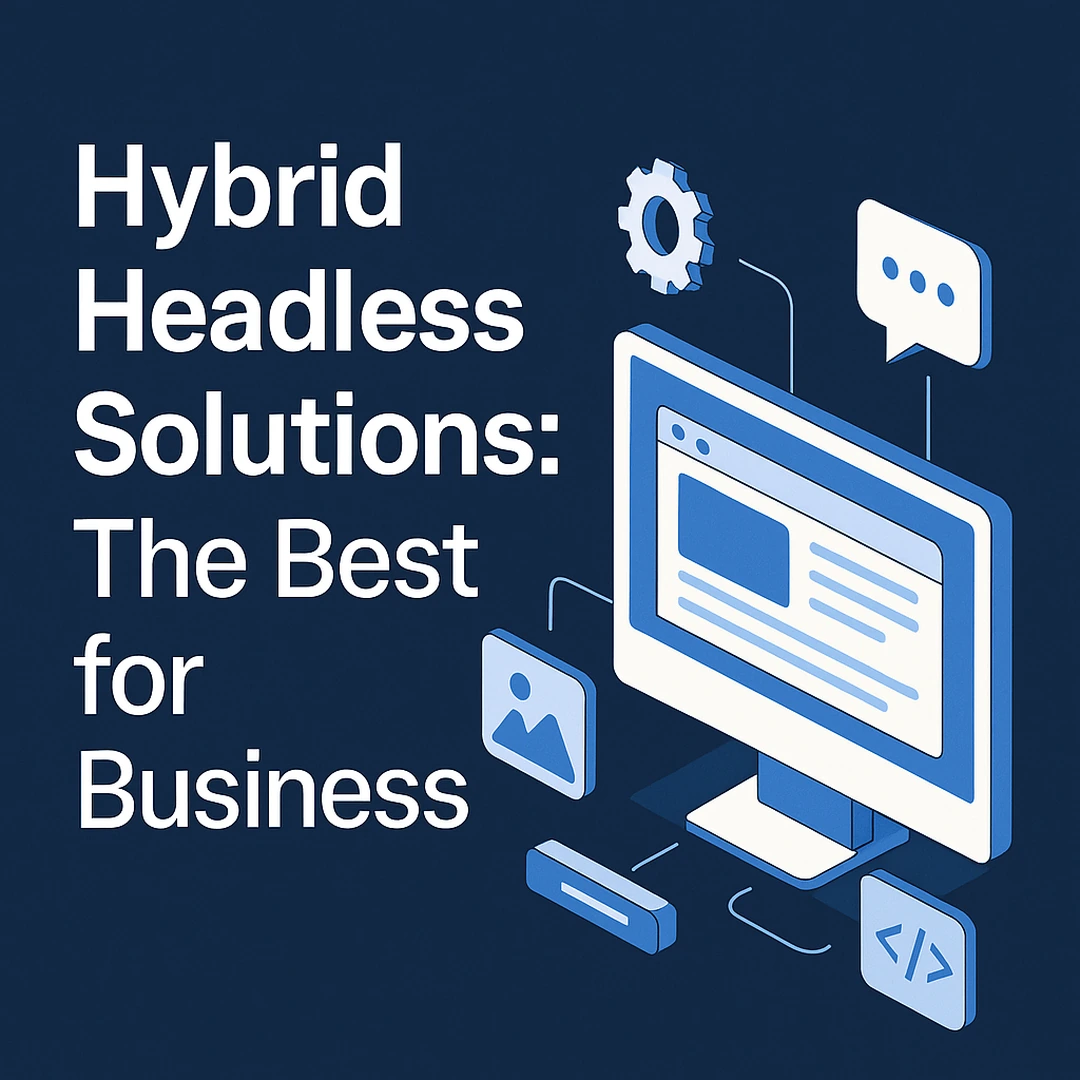Get your free consultation today!
Share with your Colleagues
Categories
ROI Calculator
Moonstone Interactive is the only San Francisco Bay Area web design firm and Internet Marketing expert that offers a free online ROI Calculator
Author: Steve Herz

Table of Content
- Cloud Content Management Systems Defined
- Types of Cloud CMS Models
- How Does a CMS Work?
- Why Do Businesses Need a Cloud Content Management Platform?
- Find the Perfect Cloud CMS For You
- FAQs About Cloud Content Management Systems
Are you tired of hunting for documents or dealing with a mess of files across various systems? A cloud content management system (CMS) might just be what you need. It goes beyond storing files and makes it easier for your team to access, organize, and collaborate on content from anywhere.
But what exactly is a cloud CMS, how does it work, and how can it help your business? We'll break it down for you in this article.
Cloud Content Management Systems Defined
A Cloud Content Management System is a tool for helping businesses manage, organize, and store digital content in the cloud, such as documents, images, videos, and more.
Instead of saving everything on local servers or hard drives, you save everything in a secure, remote cloud environment. This setup lets you access your files from anywhere, anytime, using an internet connection.
It's the modern way to manage content, especially for businesses that must stay flexible and connected across different locations.
Types of Cloud CMS Models
Not all cloud CMS platforms work the same way. Different models are depending on how much control and customization you want.

IaaS
With Infrastructure-as-a-Service (IaaS), you manage almost everything yourself—data storage, operating systems, and applications. The cloud provider manages the infrastructure (servers, networking), but you have more control over setting things up.
This option is great if you want flexibility but are okay with handling the heavy lifting of setup and management.
PaaS
Platform-as-a-Service (PaaS) is a bit more hands-off than IaaS. The cloud provider handles the infrastructure and gives you tools to build and manage your applications. It's ideal if you want to create custom solutions without managing the nitty-gritty details like servers and databases.
SaaS
The Software-as-a-Service (SaaS) model is the most straightforward option. Everything is ready; sign up and start using the CMS. The provider handles all the technical aspects, like updates, maintenance, and security. It's a great choice if you want something easy to set up and manage.
Hybrid
A Hybrid CMS combines elements of cloud and on-premise solutions. It offers flexibility by allowing businesses to store particular sensitive content in-house while benefiting from the cloud for everything else.
How Does a CMS Work?
A cloud CMS simplifies content management by providing a user-friendly interface and automation for many backend tasks. Here's a detailed step-by-step breakdown of how a cloud CMS operates:
1. Content Upload
The first step in using a CMS is uploading your content. Whether it's a blog post, image, video, or document, a CMS makes it simple to add your content.
You typically start by logging into your CMS through a web browser. From there, you can upload files, publish content on your digital channels, or create new documents.
2. Content Organization
Once your content is uploaded, the CMS allows you to organize it. You can tag your content, categorize it, or use folders to keep everything neat. This structure helps you find specific files later when needed.
Let's say you manage a travel website. After uploading photos and articles, you can categorize your content into folders like "beaches," "mountain adventures," or "city tours." This way, when you want to update an article or add new content, you can quickly find what you need by filtering through these categories.
3. Content Editing
A big part of a CMS is its editing capabilities. Many systems offer WYSIWYG (What You See Is What You Get) editors, which allow you to change content visually, like working on a Word document. This feature simplifies the editing process because you can see how your content will look on the website while making edits.
For example, you're updating an "About Us" page. In the CMS editor, you add a new section about your team's latest achievements. You adjust the fonts, add bullet points, and insert an image of your team—all without needing to touch any code. The changes are instantly visible and show you how the page will look once it goes live.

4. Version Control
A CMS often comes with version control features. Version control tracks every change made to content and saves past versions. If something goes wrong or you prefer an older version of the content, you can revert to a previous version without losing important information.
5. Collaboration Tools
Cloud CMS platforms make it easy for teams to collaborate on content. Multiple users can log in, edit, and comment on documents. The multiple-user feature is convenient for larger teams where different people may be responsible for writing, editing, and approving content and web pages.
6. Publishing
Once your content is ready, the CMS lets you publish it to your website or app with the click of a button. You can choose to publish it immediately or schedule it for later.
Imagine you've prepared a series of holiday promotion articles for your retail site. Rather than publishing them all at once, you schedule each article to go live on specific dates using the CMS's scheduling feature. Scheduling ensures that your promotions roll out in sync with your marketing plan, which is also an excellent tactic for search engine optimization.
7. Access Control
CMS platforms allow administrators to assign different access levels to users. This flexibility helps ensure that sensitive content or critical settings are only available to those needing them.
8. Search and Retrieval
One of the most valuable features of a CMS is its ability to help users quickly find content. Users can retrieve documents or files using search bars, tags, and filters within seconds, regardless of how much content is stored.
9. Automatic Updates and Backups
Since CMS systems host the application and content online, they usually have automatic updates and backups. You won't have to manually update software or worry about losing content due to system failures.
For example, your system automatically backs up content every night, so even if your computer crashes the next day, all your content is safe in the cloud. The online backup can be restored quickly.
10. Analytics and Reporting
Many cloud CMS platforms also provide basic analytics, letting you track how well your content performs. You can see which pages get the most traffic, where visitors are coming from, and how they interact with your content.
Picture this: You run a food blog and want to know the most popular recipes. Your CMS dashboard shows that "easy dinner recipes" get the most views, and people spend several minutes on that page. This insight enables you to create more content that appeals to your audience.
Why Do Businesses Need a Cloud Content Management Platform?
Today, Businesses handle large amounts of digital content, such as documents, images, videos, and presentations. Keeping this organized and accessible can be challenging, especially as teams grow or work remotely.
A cloud content management platform solves these problems by offering a centralized, easy-to-access space for storing and managing content. Here are all the benefits you can expect from a suitable cloud-based CMS:
Easy Access from Anywhere
Unlike legacy systems, a cloud CMS enables access to your content from anywhere with an internet connection. Your team can sign in and access the files in real time, whether spread across multiple locations or working remotely.
Improved Collaboration
Collaboration becomes more manageable with a cloud CMS. Team members can edit the same document, leave comments, track changes, and see real-time updates—no more endless email chains with attachments or worrying about who has the latest version of a file.

Scalability
As your business grows, so does your web content. A cloud CMS can scale with your needs, accommodating more users, content, and even new functionalities without significant overhauls.
Tighter Security
Cloud CMS platforms have robust security features, like encryption, user permissions, and multi-factor authentication. These features secure your content from unauthorized access, and regular backups ensure you won't lose important data.
Cost-Effective
Running your servers and managing software updates can be expensive. The provider handles maintenance, updates, and infrastructure with a cloud CMS, so you don't need to invest in costly hardware or dedicated IT staff.
Centralized Content Management
A cloud CMS stores all your content in one easily searchable location. Whether it's a marketing asset, legal document, or training video, this feature makes organizing, searching, and retrieving content easier when needed.
Find the Perfect Cloud CMS For You
Managing your content shouldn't be a headache. If you're tired of digging through messy files, dealing with outdated versions, or struggling to collaborate with your team, a cloud content management system can solve those pain points. It keeps everything in one place, makes working together easy, and ensures that your files are always secure and up to date.
Don't let content chaos slow you down. Contact Moonstone Interactive today, and let's tackle those challenges head-on. We'll help you find a solution that simplifies your content management and maximizes productivity!
Moonstone Interactive is a certified developer for two industry-renowned DXP platforms: Kentico Xperience and Optimizely DXP. Contact Moonstone today for a free consultation!
FAQs About Cloud Content Management Systems
What's the difference between a traditional CMS and a cloud CMS?
A traditional CMS platform is hosted on local servers, while a cloud CMS is online. Since everything is in the cloud, a cloud CMS offers better accessibility and collaboration features.
Is Cloud CMS secure?
Yes, cloud-based systems often include advanced security features like encryption, multi-factor authentication, and regular backups to keep your data safe.
How does a cloud CMS save money?
You don't have to buy or maintain expensive servers or IT infrastructure. Many cloud CMS platforms offer flexible pricing models, so you only pay for what you need.
What is an enterprise content management system?
An enterprise content management system (ECM) platform helps businesses organize, store, and manage websites, large volumes of documents, and digital content. It streamlines processes like document tracking, workflow automation, and security, making it easier for teams to collaborate and ensuring secure, efficient content handling across an organization.
.webp?ext=.webp)

